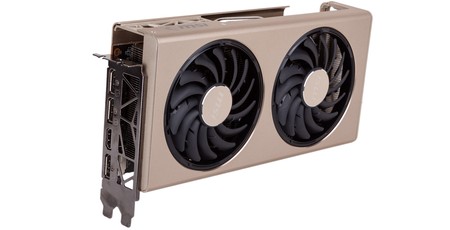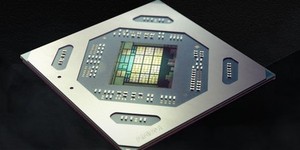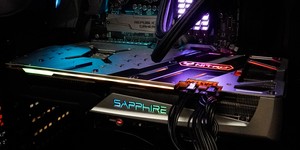Test Setup
Our GPU test rig uses Intel's Z370 platform. Specifically, we use the Asus ROG Maximus X Hero paired with an Intel Core i9-9900K. With eight cores and 16 threads via Hyper-Threading, the CPU ensures even the most multi-threaded games won't be bottlenecked, and we've overclocked it to 4.9GHz as well with a base clock of 100MHz, a multiplier of 49, and a vcore of 1.315V, further alleviating CPU bottlenecks. The CPU is paired with 32GB (4 x 8GB) of Corsair Vengeance RGB DDR4 clocked at 3,200MHz and cooled by a Corsair Hydro Series H115i Pro RGB.
The rig is powered by the Corsair AX1500i, which has enough wattage and eight-pin PCIe power connectors to deal with any multi-GPU set-up we care to throw at it. It's all housed inside a Corsair Carbide Series Air 740, which is spacious enough for any card. The final component is a Corsair Force Series MP510 960GB PCIe 3.0 x4 M.2 SSD, giving us plenty of space for game installs and keeping load times down.
Our results come from a mix of built-in benchmarks and custom, manually played sections, depending on the game. All game benchmarks are repeated at least three times to ensure consistency. We test at 1,920 x 1,080 (1080p), 2,560 x 1,440 (1440p), and 3,840 x 2,160 (4K), though some resolutions are excluded if they are deemed inappropriate for a certain card. The operating system is an up-to-date copy of Windows 10 64-bit.
As well as the average frame rate, we report the 99th percentile frame rate that is a better representation of the "minimum" frame rate in terms of experience than the single slowest frame of the entire benchmark. Obtaining this figure involves using software (currently OCAT - the Open Capture and Analytics Tool) to record the render time of every single frame in a benchmark, meaning poor performance has nowhere to hide. Such software typically gives you a 99th percentile frame time in milliseconds. Dividing 1,000 by this figure converts it into a frame rate measurement.
Test System
- CPU Intel Core i9-9900K at 4.9GHz (49 x 100MHz)
- Motherboard Asus ROG Maximus X Hero
- Memory 4 x 8GB Corsair Vengeance RGB 3,200MHz DDR4
- PSU Corsair AX1500i
- SSD Corsair Force Series MP510 960GB
- Case Corsair Carbide Series Air 740
- CPU cooler Corsair Hydro Series H115i Pro RGB
- Operating system Windows 10 64-bit
AMD Graphics Cards
MSI Radeon RX 5700 XT Evoke OC 8GB - 1,690MHz GPU (1,835MHz Game Clock), 14Gbps GDDR6 (Radeon Software Adrenalin 19.7.5)
Sapphire Radeon RX 5700 XT Pulse 8GB - 1,670MHz GPU (1,815MHz Game Clock), 14Gbps GDDR6 (Radeon Software Adrenalin 19.7.5)
AMD Radeon RX 5700 XT 8GB - 1,605MHz GPU (1,755MHz Game Clock), 14Gbps GDDR6 (Radeon Software Adrenalin 19.7.1 press drivers)
AMD Radeon RX 5700 8GB - 1,465MHz GPU (1,625MHz Game Clock), 14Gbps GDDR6 (Radeon Software Adrenalin 19.7.1 press drivers)
AMD Radeon VII 16GB - 1,400MHz GPU (1,750MHz boost), 2Gbps HBM2 (Radeon Software Adrenalin 19.6.3)
AMD Radeon RX Vega 64 8GB - 1,274MHz GPU (1,546MHz boost), 1.89Gbps HBM2 (Radeon Software Adrenalin 19.6.3)
Nvidia Graphics Cards
Nvidia GeForce RTX 2080 Ti Founders Edition - 1,350MHz GPU (1,635MHz boost), 14Gbps GDDR6 (GeForce 431.16)
Nvidia GeForce RTX 2080 Super Founders Edition - 1,650MHz GPU (1,815MHz boost), 14Gbps GDDR6 (GeForce 431.56 press drivers)
Nvidia GeForce RTX 2080 Founders Edition - 1,515MHz GPU (1,800MHz boost), 14Gbps GDDR6 (GeForce 430.86)
Nvidia GeForce RTX 2070 Super Founders Edition 8GB - 1,605MHz GPU (1,770MHz boost), 14Gbps GDDR6 (GeForce 431.16 press drivers)
Palit GeForce RTX 2070 Dual 8GB - 1,410MHz GPU (1,620MHz boost), 14Gbps GDDR6 (GeForce 430.86)
Gigabyte GeForce RTX 2060 Super Gaming OC 8GB - 1,470MHz GPU (1,815MHz boost), 14Gbps GDDR6 (GeForce 431.60)
Nvidia GeForce RTX 2060 Super Founders Edition 8GB - 1,470MHz GPU (1,650MHz boost), 14Gbps GDDR6 (GeForce 431.16 press drivers)
Nvidia GeForce RTX 2060 Founders Edition 6GB - 1,365MHz GPU (1,680MHz boost), 14Gbps GDDR6 (GeForce 430.86)

MSI MPG Velox 100R Chassis Review
October 14 2021 | 15:04









Want to comment? Please log in.